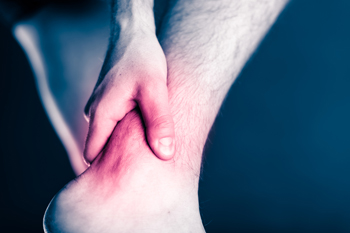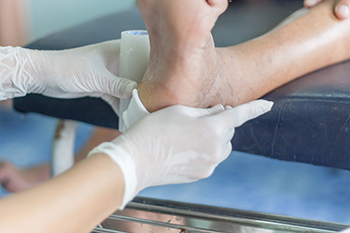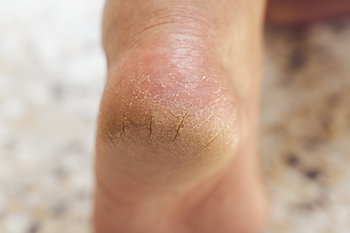Blog

An Achilles tendon rupture is a significant injury that often occurs during sports or sudden movement, usually felt as a sharp pain or a popping sensation in the back of the ankle. Walking becomes difficult, and pushing off the foot may feel impossible. Management depends on the severity of the tear and the patient’s overall health and activity level. Non-surgical treatment includes immobilization with a cast or walking boot, followed by specific exercises to restore strength and flexibility. Surgical repair may be recommended for younger or more active individuals to reduce the risk of re-rupture and support a quicker return to activity. Both approaches require a period of rest, followed by a carefully guided rehabilitation program. Prompt diagnosis is key to determining the most effective treatment. If you experience sudden pain or loss of function in your lower leg, it is suggested you see a podiatrist for a diagnosis and appropriate treatment.
Achilles tendon injuries need immediate attention to avoid future complications. If you have any concerns, contact Shaun J. Limon, DPM and Lisa Griffith-Limon, DPM of Limons Foot & Ankle Care. Our doctors can provide the care you need to keep you pain-free and on your feet.
What Is the Achilles Tendon?
The Achilles tendon is a tendon that connects the lower leg muscles and calf to the heel of the foot. It is the strongest tendon in the human body and is essential for making movement possible. Because this tendon is such an integral part of the body, any injuries to it can create immense difficulties and should immediately be presented to a doctor.
What Are the Symptoms of an Achilles Tendon Injury?
There are various types of injuries that can affect the Achilles tendon. The two most common injuries are Achilles tendinitis and ruptures of the tendon.
Achilles Tendinitis Symptoms
- Inflammation
- Dull to severe pain
- Increased blood flow to the tendon
- Thickening of the tendon
Rupture Symptoms
- Extreme pain and swelling in the foot
- Total immobility
Treatment and Prevention
Achilles tendon injuries are diagnosed by a thorough physical evaluation, which can include an MRI. Treatment involves rest, physical therapy, and in some cases, surgery. However, various preventative measures can be taken to avoid these injuries, such as:
- Thorough stretching of the tendon before and after exercise
- Strengthening exercises like calf raises, squats, leg curls, leg extensions, leg raises, lunges, and leg presses
If you have any questions please feel free to contact our office located in Lakewood Ranch, FL . We offer the newest diagnostic tools and technology to treat your foot and ankle needs.

Heel pressure ulcers develop when prolonged pressure cuts off blood flow to the skin, often in people with limited mobility or underlying health conditions. These wounds can be painful, slow to heal, and prone to infection if not properly managed. Treatment begins by relieving pressure on the area. This might involve special cushions, offloading boots, or frequent repositioning. Keeping the skin clean and moisturized helps prevent further breakdown. A podiatrist may use dressings designed to promote healing and protect against bacteria. In more advanced cases, debridement or advanced wound therapies may be needed. Managing diabetes or circulation issues is also key to recovery. With consistent care, many pressure ulcers can heal and be prevented from returning. If you or a loved one has a sore on the heel that is not improving, it is suggested that you seek help from a podiatrist as quickly as possible.
Wound care is an important part in dealing with diabetes. If you have diabetes and a foot wound or would like more information about wound care for diabetics, consult with Shaun J. Limon, DPM and Lisa Griffith-Limon, DPM from Limons Foot & Ankle Care. Our doctors will assess your condition and provide you with quality foot and ankle treatment.
What Is Wound Care?
Wound care is the practice of taking proper care of a wound. This can range from the smallest to the largest of wounds. While everyone can benefit from proper wound care, it is much more important for diabetics. Diabetics often suffer from poor blood circulation which causes wounds to heal much slower than they would in a non-diabetic.
What Is the Importance of Wound Care?
While it may not seem apparent with small ulcers on the foot, for diabetics, any size ulcer can become infected. Diabetics often also suffer from neuropathy, or nerve loss. This means they might not even feel when they have an ulcer on their foot. If the wound becomes severely infected, amputation may be necessary. Therefore, it is of the upmost importance to properly care for any and all foot wounds.
How to Care for Wounds
The best way to care for foot wounds is to prevent them. For diabetics, this means daily inspections of the feet for any signs of abnormalities or ulcers. It is also recommended to see a podiatrist several times a year for a foot inspection. If you do have an ulcer, run the wound under water to clear dirt from the wound; then apply antibiotic ointment to the wound and cover with a bandage. Bandages should be changed daily and keeping pressure off the wound is smart. It is advised to see a podiatrist, who can keep an eye on it.
If you have any questions, please feel free to contact our office located in Lakewood Ranch, FL . We offer the newest diagnostic and treatment technologies for all your foot care needs.

Cracked heels are a common foot issue, but in individuals with diabetes, they can signal more serious concerns. Diabetes often leads to dry skin due to reduced oil and sweat gland function, especially in the feet. This dryness increases the risk of skin cracking, particularly around the heels where pressure is greatest. Poor circulation and nerve damage associated with diabetes can prevent individuals from noticing early signs of skin breakdown. When cracks deepen, they can allow bacteria to enter, raising the risk of infection. Healing may also be slower due to impaired blood flow. Proper foot care is essential for people with diabetes. If you have diabetes and have developed cracked heels, it is suggested that you are under the care of a podiatrist who can treat foot problems and help you to manage this condition.
Diabetic foot care is important in preventing foot ailments such as ulcers. If you are suffering from diabetes or have any other concerns about your feet, contact Shaun J. Limon, DPM and Lisa Griffith-Limon, DPM from Limons Foot & Ankle Care. Our doctors can provide the care you need to keep you pain-free and on your feet.
Diabetic Foot Care
Diabetes affects millions of people every year. The condition can damage blood vessels in many parts of the body, especially the feet. Because of this, taking care of your feet is essential if you have diabetes, and having a podiatrist help monitor your foot health is highly recommended.
The Importance of Caring for Your Feet
- Routinely inspect your feet for bruises or sores.
- Wear socks that fit your feet comfortably.
- Wear comfortable shoes that provide adequate support.
Patients with diabetes should have their doctor monitor their blood levels, as blood sugar levels play such a huge role in diabetic care. Monitoring these levels on a regular basis is highly advised.
It is always best to inform your healthcare professional of any concerns you may have regarding your feet, especially for diabetic patients. Early treatment and routine foot examinations are keys to maintaining proper health, especially because severe complications can arise if proper treatment is not applied.
If you have any questions please feel free to contact our office located in Lakewood Ranch, FL . We offer the newest diagnostic and treatment technologies for all your foot and ankle needs.

